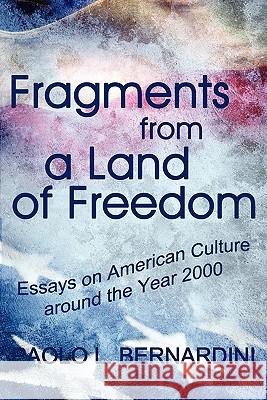Fragments from a Land of Freedom: Essays in American Culture around the Year 2000 » książka
Fragments from a Land of Freedom: Essays in American Culture around the Year 2000
ISBN-13: 9780979448898 / Angielski / Miękka / 2010 / 190 str.
This book covers the USA around 2000 through the lens of cultural studies: books, events, exhibitions, and places of learning are seen as mirrors of an affluent, self-sufficient, at least apparently harmonic society just before the collapse of the markets and the 9/11 tragedy. America seemed to be unaware of what history had in place for her. The country was coming to terms with its past, looking favorably towards the future, and waiting for even better times ahead. This book explores movies, from Spike Lee's to Stanley Kubrick's; cities, from Atlantic City to Philadelphia; minorities, from the Jews of New York to the Hutterites; public figures, from Albert Hirschman to David Landes. Fragments of the cultural and intellectual scene of the end of the century are captured in order to provide a balanced, critical view, of those happy days before major challenges struck and set in motion an apparently motionless America. Contrary to Francis Fukuyama, the author of this book thinks that history will never stand still, for good and for evil. "An original and path-breaking work, which follows and re-invent a long tradition of Italian writers attracted by contemporary USA, from Vittorini to Calvino, from Luigi Barzini jr. to Arbasino, with a keen eye on major and minor themes as well." -Sergio Romano
This book covers the USA around 2000 through the lens of cultural studies: books, events, exhibitions, and places of learning are seen as mirrors of an affluent, self-sufficient, at least apparently harmonic society just before the collapse of the markets and the 9/11 tragedy. America seemed to be unaware of what history had in place for her. The country was coming to terms with its past, looking favorably towards the future, and waiting for even better times ahead. This book explores movies, from Spike Lees to Stanley Kubricks; cities, from Atlantic City to Philadelphia; minorities, from the Jews of New York to the Hutterites; public figures, from Albert Hirschman to David Landes. Fragments of the cultural and intellectual scene of the end of the century are captured in order to provide a balanced, critical view, of those happy days before major challenges struck and set in motion an apparently motionless America. Contrary to Francis Fukuyama, the author of this book thinks that history will never stand still, for good and for evil."An original and path-breaking work, which follows and re-invent a long tradition of Italian writers attracted by contemporary USA, from Vittorini to Calvino, from Luigi Barzini jr. to Arbasino, with a keen eye on major and minor themes as well." -Sergio Romano











